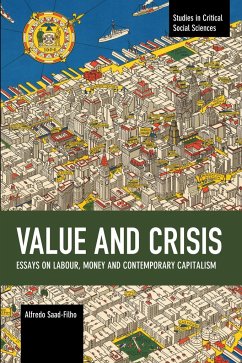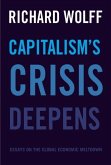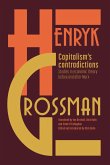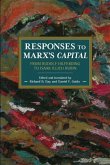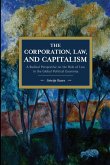- Broschiertes Buch
- Merkliste
- Auf die Merkliste
- Bewerten Bewerten
- Teilen
- Produkt teilen
- Produkterinnerung
- Produkterinnerung
A landmark collection of essays by renowned Marxist political economist Alfredo Saad-Filho.
Andere Kunden interessierten sich auch für
![Capitalism's Crisis Deepens Capitalism's Crisis Deepens]() Richard D WolffCapitalism's Crisis Deepens18,99 €
Richard D WolffCapitalism's Crisis Deepens18,99 €![Capitalism's Contradictions Capitalism's Contradictions]() Henryk GrossmanCapitalism's Contradictions21,99 €
Henryk GrossmanCapitalism's Contradictions21,99 €![Marx's Theory of the Genesis of Money Marx's Theory of the Genesis of Money]() Samez Kuruma &Marx's Theory of the Genesis of Money33,99 €
Samez Kuruma &Marx's Theory of the Genesis of Money33,99 €![Responses to Marx's Capital Responses to Marx's Capital]() Responses to Marx's Capital77,99 €
Responses to Marx's Capital77,99 €![Modern Imperialism, Monopoly Finance Capital, and Marx's Law of Value Modern Imperialism, Monopoly Finance Capital, and Marx's Law of Value]() Samir AminModern Imperialism, Monopoly Finance Capital, and Marx's Law of Value35,99 €
Samir AminModern Imperialism, Monopoly Finance Capital, and Marx's Law of Value35,99 €![The Corporation, Law, and Capitalism The Corporation, Law, and Capitalism]() Grietje BaarsThe Corporation, Law, and Capitalism47,99 €
Grietje BaarsThe Corporation, Law, and Capitalism47,99 €![Marx on Capitalism Marx on Capitalism]() James FurnerMarx on Capitalism54,99 €
James FurnerMarx on Capitalism54,99 €-
-
A landmark collection of essays by renowned Marxist political economist Alfredo Saad-Filho.
Hinweis: Dieser Artikel kann nur an eine deutsche Lieferadresse ausgeliefert werden.
Hinweis: Dieser Artikel kann nur an eine deutsche Lieferadresse ausgeliefert werden.
Produktdetails
- Produktdetails
- Verlag: Haymarket Books
- Seitenzahl: 363
- Erscheinungstermin: 7. April 2020
- Englisch
- Abmessung: 226mm x 152mm x 20mm
- Gewicht: 499g
- ISBN-13: 9781642591903
- ISBN-10: 1642591904
- Artikelnr.: 58697384
- Herstellerkennzeichnung
- Libri GmbH
- Europaallee 1
- 36244 Bad Hersfeld
- gpsr@libri.de
- Verlag: Haymarket Books
- Seitenzahl: 363
- Erscheinungstermin: 7. April 2020
- Englisch
- Abmessung: 226mm x 152mm x 20mm
- Gewicht: 499g
- ISBN-13: 9781642591903
- ISBN-10: 1642591904
- Artikelnr.: 58697384
- Herstellerkennzeichnung
- Libri GmbH
- Europaallee 1
- 36244 Bad Hersfeld
- gpsr@libri.de
Alfredo Saad-Filho is Professor of Political Economy at SOAS University of London. He is co-author of Marx’s Capital and Brazil: Neoliberalism versus Democracy (Pluto Press, 2017), and numerous works on Marxist political economy, political economy of development, neoliberalism, democracy, and alternative economic policies.
Acknowledgements
Introduction
1 Method
2 The Theory of Value
3 Systems of Accumulation
4 Neoliberalism
5 Outline of the Book
Part 1: Essays on the Theory of Value
1 Marxist Economics
1 The Method and Approach of Marxist Political Economy
2 The Labour Theory of Value
3 Commodities, Labour and Value
4 Capital and Capitalism
5 From Value to Surplus Value
6 Profit and (Increasing) Exploitation
7 Marxist Political Economy, Laws of Development and Contemporary
Capitalism
8 Conclusion
2 The Relevance of Marx’s Theory of Value
1 Interpretations of Marx’s Theory of Value
1.1 Traditional Marxism
1.2 Sraffian Analyses
1.3 Value Form Theories
1.4 The ‘New Interpretation’
2 Value Theory and Class Analysis
2.1 Principles
2.2 Implications
3 Conclusion
3 Labour, Money and ‘Labour-Money’: A Review of Marx’s Critique of John
Gray’s Monetary Analysis
1 Labour, Money, Exploitation
2 Marx on Labour and Money
3 Money, Value, and Price
4 The Other Functions of Money
5 Labour-Money in Retrospect
6 Conclusion
4 Capital Accumulation and the Composition of Capital
1 Capital and Exploitation
2 Understanding the Composition of Capital
3 Production and the Composition of Capital
4 Capital Accumulation
5 Conclusion
5 The ‘Transformation Problem’
1 The ‘Problem’
2 Alternative Interpretations
2.1 Neoclassical and Sraffian
2.2 Value-Form Theories
2.3 Dynamic Analysis
3 Marx’s Transformation: A Review
4 The Transformation and its Method
5 Conclusion
6 Transforming the Transformation Problem: Why the ‘New Interpretation’ is
a Wrong Turning
1 The ‘New Interpretation’: A Simple Formal Presentation
2 Value of Money
3 Value of Labour Power
4 Structure, Sequence and Dynamics
5 Conclusion
7 The Supply of Credit Money and Capital Accumulation: A Critical View of
Post-Keynesian Analysis
1 The Fundamental Process of Endogenous Money Creation
2 Commodity and Credit Money Systems
3 Money and Inflation
4 Two Steps Forward – One Step Back
4.1 The Origin and Role of Money in the Economy
4.2 Horizontal Money Supply
4.3 Inflation
5 Conclusion: What is Important for the Way Ahead?
8 Inflation Theory: A Critical Literature Review and a New Research Agenda
1 Conflict and Inflation
1.1 Conflict Theories
1.2 Assessment
2 Monopolies, Underconsumption, and Inflation
2.1 Inflation Theory
2.2 Assessment
3 Credit, Extra Money, and Inflation
3.1 Money and Credit
3.2 Extra Money Inflation
3.3 Inconvertibility and Inflation
3.4 Assessment
4 Conclusion
Part 2: Essays on Contemporary Capitalism
9 Anti-capitalism: A Marxist Introduction
1 Capitalism and Anti-Capitalism
2 September 11 and Beyond
3 Four Pressing Issues
3.1 Neoliberalism
3.2 Globalisation
3.3 Corporate Power
3.4 Democracy
4 The Way Ahead
5 Leaving Capitalism Behind
10 Neoliberalism
1 Neoliberal Ideas
2 Policy Shifts and Institutional Changes
3 Classes and Class Struggle
4 Neoliberalism, Financialisation and Globalisation
5 Contradictions and Limitations
11 Thirteen Things You Need to Know About Neoliberalism
1 A New Stage
2 An Ideology?
3 A Reaction?
4 Markets and States
5 Financialisation
6 Policy Changes
7 The Balance of Power
8 Scholarship, Policy and Practice
9 Two Phases
10 Variegated Neoliberalism
11 Everyday life
12 Growth, Volatility and Crises
13 Alternatives
12 Democracy Against Neoliberalism
1 Capitalism and Democracy
2 Democracy in the Age of Neoliberalism
3 The Limitations of Neoliberal Democracy
4 Economic and Political Imbalances
5 Globalism and (Nation-)States
6 New Authoritarianism
7 Transcending Neoliberalism through Radical Democracy
8 Conclusion
13 Monetary Policy and Neoliberalism
1 Monetary Policy for Mature Neoliberalism
2 Inflation Targeting and Central Bank Independence
3 The New Monetary Policy Consensus in Practice
4 The Performance of Inflation-Targeting Regime and Central Bank
Independence
5 Costs of the New Monetary Policy Consensus
5.1 The Cost of High Interest Rates
5.2 The Cost of Conflicts between Inflation Targeting and Balance of
Payments Equilibrium
5.3 The Cost of Financial Instability
5.4 The Cost of Central Bank ‘Independence’
6 The Impact of the Global Crisis
7 Conclusion
14 Neoliberal Development and Its Critics
1 Neoliberalism and Its Critics
2 Neoliberalism and Development
3 Neoliberalism, Politics and Development
4 Conclusion
15 CrisisinNeoliberalism or CrisisofNeoliberalism?
1 Neoliberalism and Financialisation
2 Financialisation and Social Discipline
3 Neoliberalism’s Contradictions
4 Not Moving Forward
5 Coming Out of Left Field
References
Index
Introduction
1 Method
2 The Theory of Value
3 Systems of Accumulation
4 Neoliberalism
5 Outline of the Book
Part 1: Essays on the Theory of Value
1 Marxist Economics
1 The Method and Approach of Marxist Political Economy
2 The Labour Theory of Value
3 Commodities, Labour and Value
4 Capital and Capitalism
5 From Value to Surplus Value
6 Profit and (Increasing) Exploitation
7 Marxist Political Economy, Laws of Development and Contemporary
Capitalism
8 Conclusion
2 The Relevance of Marx’s Theory of Value
1 Interpretations of Marx’s Theory of Value
1.1 Traditional Marxism
1.2 Sraffian Analyses
1.3 Value Form Theories
1.4 The ‘New Interpretation’
2 Value Theory and Class Analysis
2.1 Principles
2.2 Implications
3 Conclusion
3 Labour, Money and ‘Labour-Money’: A Review of Marx’s Critique of John
Gray’s Monetary Analysis
1 Labour, Money, Exploitation
2 Marx on Labour and Money
3 Money, Value, and Price
4 The Other Functions of Money
5 Labour-Money in Retrospect
6 Conclusion
4 Capital Accumulation and the Composition of Capital
1 Capital and Exploitation
2 Understanding the Composition of Capital
3 Production and the Composition of Capital
4 Capital Accumulation
5 Conclusion
5 The ‘Transformation Problem’
1 The ‘Problem’
2 Alternative Interpretations
2.1 Neoclassical and Sraffian
2.2 Value-Form Theories
2.3 Dynamic Analysis
3 Marx’s Transformation: A Review
4 The Transformation and its Method
5 Conclusion
6 Transforming the Transformation Problem: Why the ‘New Interpretation’ is
a Wrong Turning
1 The ‘New Interpretation’: A Simple Formal Presentation
2 Value of Money
3 Value of Labour Power
4 Structure, Sequence and Dynamics
5 Conclusion
7 The Supply of Credit Money and Capital Accumulation: A Critical View of
Post-Keynesian Analysis
1 The Fundamental Process of Endogenous Money Creation
2 Commodity and Credit Money Systems
3 Money and Inflation
4 Two Steps Forward – One Step Back
4.1 The Origin and Role of Money in the Economy
4.2 Horizontal Money Supply
4.3 Inflation
5 Conclusion: What is Important for the Way Ahead?
8 Inflation Theory: A Critical Literature Review and a New Research Agenda
1 Conflict and Inflation
1.1 Conflict Theories
1.2 Assessment
2 Monopolies, Underconsumption, and Inflation
2.1 Inflation Theory
2.2 Assessment
3 Credit, Extra Money, and Inflation
3.1 Money and Credit
3.2 Extra Money Inflation
3.3 Inconvertibility and Inflation
3.4 Assessment
4 Conclusion
Part 2: Essays on Contemporary Capitalism
9 Anti-capitalism: A Marxist Introduction
1 Capitalism and Anti-Capitalism
2 September 11 and Beyond
3 Four Pressing Issues
3.1 Neoliberalism
3.2 Globalisation
3.3 Corporate Power
3.4 Democracy
4 The Way Ahead
5 Leaving Capitalism Behind
10 Neoliberalism
1 Neoliberal Ideas
2 Policy Shifts and Institutional Changes
3 Classes and Class Struggle
4 Neoliberalism, Financialisation and Globalisation
5 Contradictions and Limitations
11 Thirteen Things You Need to Know About Neoliberalism
1 A New Stage
2 An Ideology?
3 A Reaction?
4 Markets and States
5 Financialisation
6 Policy Changes
7 The Balance of Power
8 Scholarship, Policy and Practice
9 Two Phases
10 Variegated Neoliberalism
11 Everyday life
12 Growth, Volatility and Crises
13 Alternatives
12 Democracy Against Neoliberalism
1 Capitalism and Democracy
2 Democracy in the Age of Neoliberalism
3 The Limitations of Neoliberal Democracy
4 Economic and Political Imbalances
5 Globalism and (Nation-)States
6 New Authoritarianism
7 Transcending Neoliberalism through Radical Democracy
8 Conclusion
13 Monetary Policy and Neoliberalism
1 Monetary Policy for Mature Neoliberalism
2 Inflation Targeting and Central Bank Independence
3 The New Monetary Policy Consensus in Practice
4 The Performance of Inflation-Targeting Regime and Central Bank
Independence
5 Costs of the New Monetary Policy Consensus
5.1 The Cost of High Interest Rates
5.2 The Cost of Conflicts between Inflation Targeting and Balance of
Payments Equilibrium
5.3 The Cost of Financial Instability
5.4 The Cost of Central Bank ‘Independence’
6 The Impact of the Global Crisis
7 Conclusion
14 Neoliberal Development and Its Critics
1 Neoliberalism and Its Critics
2 Neoliberalism and Development
3 Neoliberalism, Politics and Development
4 Conclusion
15 CrisisinNeoliberalism or CrisisofNeoliberalism?
1 Neoliberalism and Financialisation
2 Financialisation and Social Discipline
3 Neoliberalism’s Contradictions
4 Not Moving Forward
5 Coming Out of Left Field
References
Index
Acknowledgements
Introduction
1 Method
2 The Theory of Value
3 Systems of Accumulation
4 Neoliberalism
5 Outline of the Book
Part 1: Essays on the Theory of Value
1 Marxist Economics
1 The Method and Approach of Marxist Political Economy
2 The Labour Theory of Value
3 Commodities, Labour and Value
4 Capital and Capitalism
5 From Value to Surplus Value
6 Profit and (Increasing) Exploitation
7 Marxist Political Economy, Laws of Development and Contemporary
Capitalism
8 Conclusion
2 The Relevance of Marx’s Theory of Value
1 Interpretations of Marx’s Theory of Value
1.1 Traditional Marxism
1.2 Sraffian Analyses
1.3 Value Form Theories
1.4 The ‘New Interpretation’
2 Value Theory and Class Analysis
2.1 Principles
2.2 Implications
3 Conclusion
3 Labour, Money and ‘Labour-Money’: A Review of Marx’s Critique of John
Gray’s Monetary Analysis
1 Labour, Money, Exploitation
2 Marx on Labour and Money
3 Money, Value, and Price
4 The Other Functions of Money
5 Labour-Money in Retrospect
6 Conclusion
4 Capital Accumulation and the Composition of Capital
1 Capital and Exploitation
2 Understanding the Composition of Capital
3 Production and the Composition of Capital
4 Capital Accumulation
5 Conclusion
5 The ‘Transformation Problem’
1 The ‘Problem’
2 Alternative Interpretations
2.1 Neoclassical and Sraffian
2.2 Value-Form Theories
2.3 Dynamic Analysis
3 Marx’s Transformation: A Review
4 The Transformation and its Method
5 Conclusion
6 Transforming the Transformation Problem: Why the ‘New Interpretation’ is
a Wrong Turning
1 The ‘New Interpretation’: A Simple Formal Presentation
2 Value of Money
3 Value of Labour Power
4 Structure, Sequence and Dynamics
5 Conclusion
7 The Supply of Credit Money and Capital Accumulation: A Critical View of
Post-Keynesian Analysis
1 The Fundamental Process of Endogenous Money Creation
2 Commodity and Credit Money Systems
3 Money and Inflation
4 Two Steps Forward – One Step Back
4.1 The Origin and Role of Money in the Economy
4.2 Horizontal Money Supply
4.3 Inflation
5 Conclusion: What is Important for the Way Ahead?
8 Inflation Theory: A Critical Literature Review and a New Research Agenda
1 Conflict and Inflation
1.1 Conflict Theories
1.2 Assessment
2 Monopolies, Underconsumption, and Inflation
2.1 Inflation Theory
2.2 Assessment
3 Credit, Extra Money, and Inflation
3.1 Money and Credit
3.2 Extra Money Inflation
3.3 Inconvertibility and Inflation
3.4 Assessment
4 Conclusion
Part 2: Essays on Contemporary Capitalism
9 Anti-capitalism: A Marxist Introduction
1 Capitalism and Anti-Capitalism
2 September 11 and Beyond
3 Four Pressing Issues
3.1 Neoliberalism
3.2 Globalisation
3.3 Corporate Power
3.4 Democracy
4 The Way Ahead
5 Leaving Capitalism Behind
10 Neoliberalism
1 Neoliberal Ideas
2 Policy Shifts and Institutional Changes
3 Classes and Class Struggle
4 Neoliberalism, Financialisation and Globalisation
5 Contradictions and Limitations
11 Thirteen Things You Need to Know About Neoliberalism
1 A New Stage
2 An Ideology?
3 A Reaction?
4 Markets and States
5 Financialisation
6 Policy Changes
7 The Balance of Power
8 Scholarship, Policy and Practice
9 Two Phases
10 Variegated Neoliberalism
11 Everyday life
12 Growth, Volatility and Crises
13 Alternatives
12 Democracy Against Neoliberalism
1 Capitalism and Democracy
2 Democracy in the Age of Neoliberalism
3 The Limitations of Neoliberal Democracy
4 Economic and Political Imbalances
5 Globalism and (Nation-)States
6 New Authoritarianism
7 Transcending Neoliberalism through Radical Democracy
8 Conclusion
13 Monetary Policy and Neoliberalism
1 Monetary Policy for Mature Neoliberalism
2 Inflation Targeting and Central Bank Independence
3 The New Monetary Policy Consensus in Practice
4 The Performance of Inflation-Targeting Regime and Central Bank
Independence
5 Costs of the New Monetary Policy Consensus
5.1 The Cost of High Interest Rates
5.2 The Cost of Conflicts between Inflation Targeting and Balance of
Payments Equilibrium
5.3 The Cost of Financial Instability
5.4 The Cost of Central Bank ‘Independence’
6 The Impact of the Global Crisis
7 Conclusion
14 Neoliberal Development and Its Critics
1 Neoliberalism and Its Critics
2 Neoliberalism and Development
3 Neoliberalism, Politics and Development
4 Conclusion
15 CrisisinNeoliberalism or CrisisofNeoliberalism?
1 Neoliberalism and Financialisation
2 Financialisation and Social Discipline
3 Neoliberalism’s Contradictions
4 Not Moving Forward
5 Coming Out of Left Field
References
Index
Introduction
1 Method
2 The Theory of Value
3 Systems of Accumulation
4 Neoliberalism
5 Outline of the Book
Part 1: Essays on the Theory of Value
1 Marxist Economics
1 The Method and Approach of Marxist Political Economy
2 The Labour Theory of Value
3 Commodities, Labour and Value
4 Capital and Capitalism
5 From Value to Surplus Value
6 Profit and (Increasing) Exploitation
7 Marxist Political Economy, Laws of Development and Contemporary
Capitalism
8 Conclusion
2 The Relevance of Marx’s Theory of Value
1 Interpretations of Marx’s Theory of Value
1.1 Traditional Marxism
1.2 Sraffian Analyses
1.3 Value Form Theories
1.4 The ‘New Interpretation’
2 Value Theory and Class Analysis
2.1 Principles
2.2 Implications
3 Conclusion
3 Labour, Money and ‘Labour-Money’: A Review of Marx’s Critique of John
Gray’s Monetary Analysis
1 Labour, Money, Exploitation
2 Marx on Labour and Money
3 Money, Value, and Price
4 The Other Functions of Money
5 Labour-Money in Retrospect
6 Conclusion
4 Capital Accumulation and the Composition of Capital
1 Capital and Exploitation
2 Understanding the Composition of Capital
3 Production and the Composition of Capital
4 Capital Accumulation
5 Conclusion
5 The ‘Transformation Problem’
1 The ‘Problem’
2 Alternative Interpretations
2.1 Neoclassical and Sraffian
2.2 Value-Form Theories
2.3 Dynamic Analysis
3 Marx’s Transformation: A Review
4 The Transformation and its Method
5 Conclusion
6 Transforming the Transformation Problem: Why the ‘New Interpretation’ is
a Wrong Turning
1 The ‘New Interpretation’: A Simple Formal Presentation
2 Value of Money
3 Value of Labour Power
4 Structure, Sequence and Dynamics
5 Conclusion
7 The Supply of Credit Money and Capital Accumulation: A Critical View of
Post-Keynesian Analysis
1 The Fundamental Process of Endogenous Money Creation
2 Commodity and Credit Money Systems
3 Money and Inflation
4 Two Steps Forward – One Step Back
4.1 The Origin and Role of Money in the Economy
4.2 Horizontal Money Supply
4.3 Inflation
5 Conclusion: What is Important for the Way Ahead?
8 Inflation Theory: A Critical Literature Review and a New Research Agenda
1 Conflict and Inflation
1.1 Conflict Theories
1.2 Assessment
2 Monopolies, Underconsumption, and Inflation
2.1 Inflation Theory
2.2 Assessment
3 Credit, Extra Money, and Inflation
3.1 Money and Credit
3.2 Extra Money Inflation
3.3 Inconvertibility and Inflation
3.4 Assessment
4 Conclusion
Part 2: Essays on Contemporary Capitalism
9 Anti-capitalism: A Marxist Introduction
1 Capitalism and Anti-Capitalism
2 September 11 and Beyond
3 Four Pressing Issues
3.1 Neoliberalism
3.2 Globalisation
3.3 Corporate Power
3.4 Democracy
4 The Way Ahead
5 Leaving Capitalism Behind
10 Neoliberalism
1 Neoliberal Ideas
2 Policy Shifts and Institutional Changes
3 Classes and Class Struggle
4 Neoliberalism, Financialisation and Globalisation
5 Contradictions and Limitations
11 Thirteen Things You Need to Know About Neoliberalism
1 A New Stage
2 An Ideology?
3 A Reaction?
4 Markets and States
5 Financialisation
6 Policy Changes
7 The Balance of Power
8 Scholarship, Policy and Practice
9 Two Phases
10 Variegated Neoliberalism
11 Everyday life
12 Growth, Volatility and Crises
13 Alternatives
12 Democracy Against Neoliberalism
1 Capitalism and Democracy
2 Democracy in the Age of Neoliberalism
3 The Limitations of Neoliberal Democracy
4 Economic and Political Imbalances
5 Globalism and (Nation-)States
6 New Authoritarianism
7 Transcending Neoliberalism through Radical Democracy
8 Conclusion
13 Monetary Policy and Neoliberalism
1 Monetary Policy for Mature Neoliberalism
2 Inflation Targeting and Central Bank Independence
3 The New Monetary Policy Consensus in Practice
4 The Performance of Inflation-Targeting Regime and Central Bank
Independence
5 Costs of the New Monetary Policy Consensus
5.1 The Cost of High Interest Rates
5.2 The Cost of Conflicts between Inflation Targeting and Balance of
Payments Equilibrium
5.3 The Cost of Financial Instability
5.4 The Cost of Central Bank ‘Independence’
6 The Impact of the Global Crisis
7 Conclusion
14 Neoliberal Development and Its Critics
1 Neoliberalism and Its Critics
2 Neoliberalism and Development
3 Neoliberalism, Politics and Development
4 Conclusion
15 CrisisinNeoliberalism or CrisisofNeoliberalism?
1 Neoliberalism and Financialisation
2 Financialisation and Social Discipline
3 Neoliberalism’s Contradictions
4 Not Moving Forward
5 Coming Out of Left Field
References
Index

